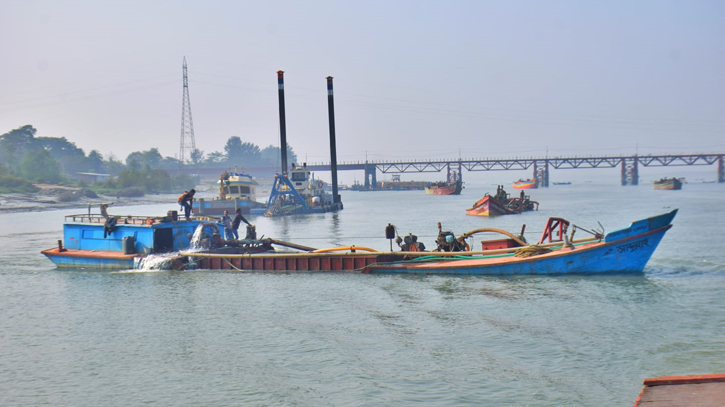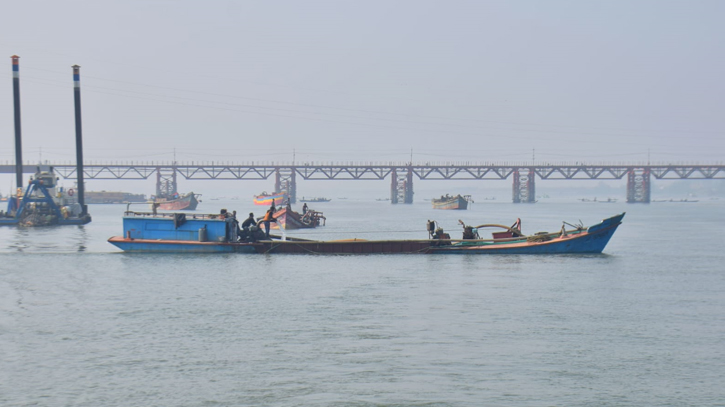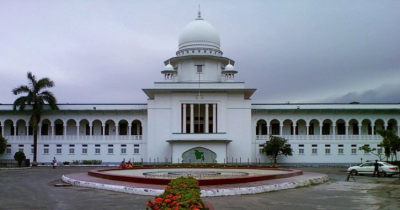
Photo : Messenger
The Karnaphuli River serves as the lifeblood and focal point of the country’s prosperity, particularly for the nation’s commercial capital, Chattogram. Trade and commerce throughout the country, including in Chattogram, revolves around this river. Regrettably, the river, often referred to as the lifeline of Bangladesh, is currently being ravaged by erosion due to illegal occupation and unregulated sand extraction.
During an on-site visit to the area, it was discovered that more than 100 dredgers are illicitly extracting sand from Bangla Bazarghat to Rangunia in Chattogram city.
- Over 100 dredgers illegally extracting sand
- Allegations of organised syndicate in sand extraction
- Concerns over biodiversity and erosion
- Revenue loss and displacement of residents
- Lack of supervision over sand mining leaseholders
It has been learnt that over 200 legal and illegal sand mining operations have been established on both sides of the river, stretching from Notun Bridge in Baklia to Kaptai in Rangunia Upazila. Boats and dredger machines laden with sand traverse the river day and night, with an estimated 45 to 50 lakh cubic feet of sand being extracted daily by 80 dredger machines. Environmentalists have expressed grave concerns, citing a crisis facing the river's biodiversity and widespread erosion along its banks.
Environmentalist and Karnaphuli River expert, Dr. Idris Ali, has emphasised that the separate extraction of sand from the Karnaphuli is leading to sedimentation in the river and disrupting its ecology. He stressed the necessity of conducting sand extraction in a scientific and well-planned manner, highlighting the absence of any systematic approach in the current extraction process, which poses a significant threat to the river and its survival.
Allegations have surfaced regarding an organised syndicate engaging in illegal sand extraction and smuggling activities across various areas of the district, including Chittagong metropolis. Additionally, the government is incurring substantial revenue losses due to the absence of leasing arrangements. Local residents have lamented the escalating erosion of the Karnaphuli riverbanks resulting from non-compliant sand extraction, leading to the displacement of hundreds of people and the loss of their homes and croplands.

On-site observations have revealed that leaseholders are freely extracting sand by deploying dredgers throughout the area. According to sources, each dredger is extracting between 30,000 to 50,000 cubic feet of sand daily. Ariful Islam, a sand seller in Kalurghat, disclosed that there are approximately 150 sand mining operations from Kalurghat to the Notun Bridge area, with over 50 dredger machines in operation. While some of these sand mining operations are approved, others are operating without proper authorisation.
He said that many of them do not have dredging machines to lift sand. Those who have dredgers are conducting business with sand from there. These sands are being brought from different areas by boats, and sand mines are being established on the banks of the river. From there, the sand is being sold outside. He mentioned, “5 to 6 lakh cubic feet of sand is sold daily from Notun Bridge, Kalurghat, and Patenga points of the Karnaphuli River. These sands are going to various construction projects, including various roads and government buildings, starting from the developer companies in Chattogram.
Journalist Aliur Rahman, the general secretary of Chattogram Reporters' Forum (CRF), who has been working diligently to protect the Karnaphuli in Chattogram, said, “The river, the backbone of the country's economy, the lifeblood of trade and commerce, cannot be pushed towards disaster in this manner. Such actions should be unequivocally condemned. The lease system of sand extraction must be halted, and all illegal activities must cease.”
Meanwhile, in the Kodala sand mining area of Rangunia, it was observed that sand was being smuggled by 10 to 12 engine boats. Due to continuous sand mining, more than 50 houses and croplands in Bhumirkhil, Madhyam Sarafbhata, Pyattalikul, Mirerkhil, Oilabhanga village of Shilak Khal, Moromer Mukh, and Phultoli villages of the upazila have been lost to the river in recent years, displacing approximately 200 people. Additionally, the houses and vast lands of about 2,000 families are on the brink of erosion on both banks of the Karnaphuli River.
It has been learned that after leasing sand mining rights, the district administration does not provide adequate supervision over the activities of the leaseholders. Furthermore, the leaseholders have not been given any criteria for determining the permissible quantity of sand extraction from each block. Consequently, a syndicate involved in sand lifting appears to have the opportunity to plunder the sand of the Karnaphuli in their own manner.
Messenger/Sajib








